2015-2016学年九年级英语上册 Module 1 GeniusesUnit 2 Great minds课件 (新版)牛津深圳版
文档属性
| 名称 | 2015-2016学年九年级英语上册 Module 1 GeniusesUnit 2 Great minds课件 (新版)牛津深圳版 | 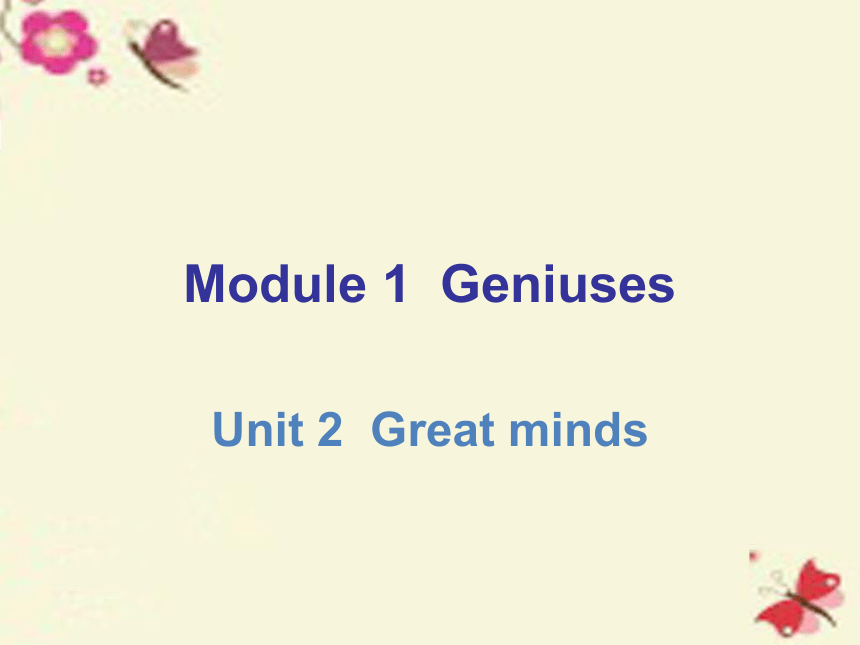 | |
| 格式 | zip | ||
| 文件大小 | 94.9KB | ||
| 资源类型 | 教案 | ||
| 版本资源 | 牛津深圳版 | ||
| 科目 | 英语 | ||
| 更新时间 | 2016-01-17 00:00:00 | ||
图片预览

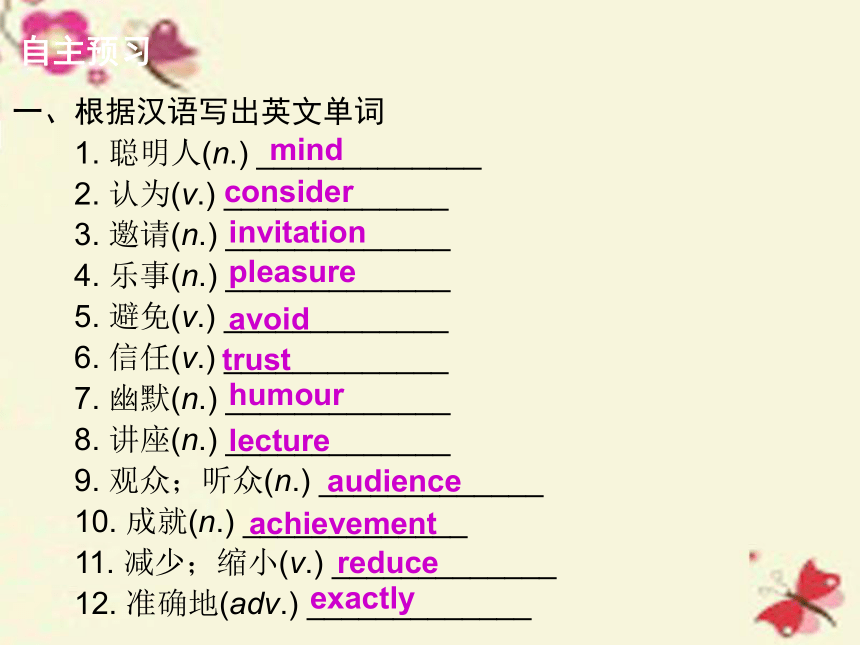

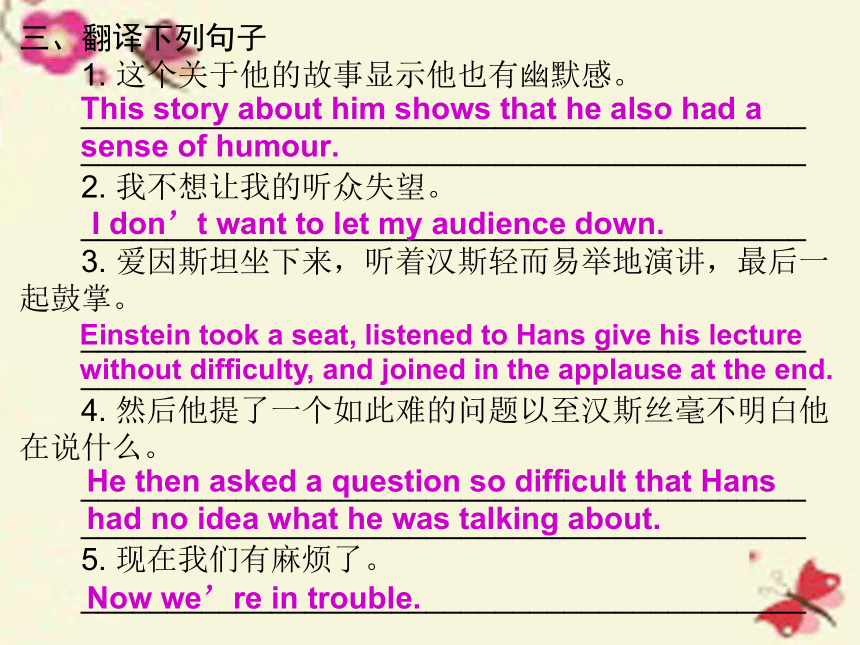

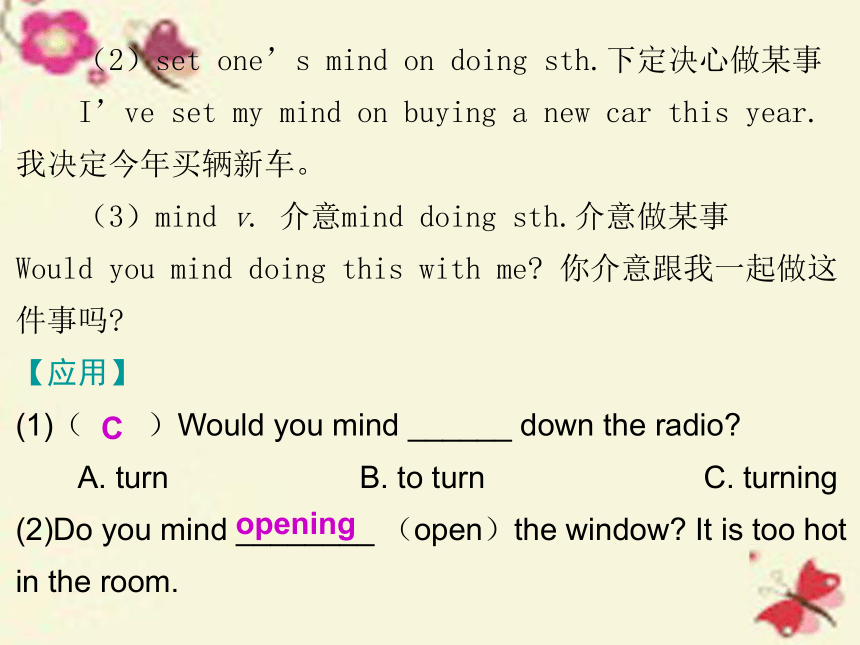

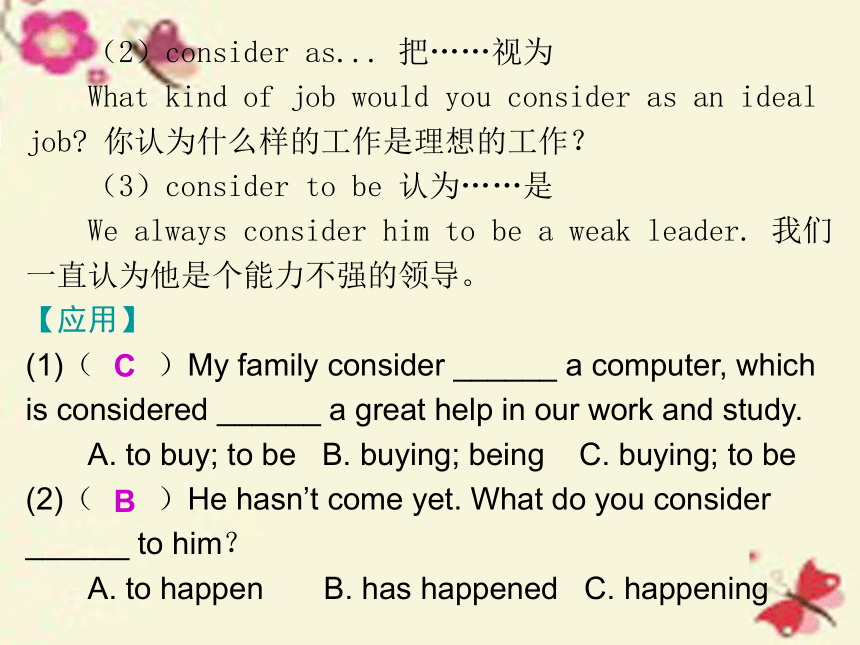

文档简介
课件26张PPT。Unit 2 Great mindsModule 1 Geniuses自主预习一、根据汉语写出英文单词
1. 聪明人(n.) _____________
2. 认为(v.) _____________
3. 邀请(n.) _____________
4. 乐事(n.) _____________
5. 避免(v.) _____________
6. 信任(v.) _____________
7. 幽默(n.) _____________
8. 讲座(n.) _____________
9. 观众;听众(n.) _____________
10. 成就(n.) _____________
11. 减少;缩小(v.) _____________
12. 准确地(adv.) _____________mindconsiderinvitationpleasureavoidtrusthumourlectureaudienceachievementreduceexactly二、根据汉语写出下列词组
1. 幽默感 ___________________
2. 使……失望 ___________________
3. 坐下___________________
4. 轻而易举___________________
5. 处于困境___________________
6. 转折点___________________
7. 跟某人开玩笑___________________
8. 一系列___________________sense of humourlet...downtake a seatwithout difficulty(be) in troubleturning pointplay a joke on sb.a series of三、翻译下列句子
1. 这个关于他的故事显示他也有幽默感。
__________________________________________
__________________________________________
2. 我不想让我的听众失望。
__________________________________________
3. 爱因斯坦坐下来,听着汉斯轻而易举地演讲,最后一起鼓掌。
__________________________________________
__________________________________________
4. 然后他提了一个如此难的问题以至汉斯丝毫不明白他在说什么。
__________________________________________
__________________________________________
5. 现在我们有麻烦了。
__________________________________________This story about him shows that he also had a
sense of humour.I don’t want to let my audience down.Einstein took a seat, listened to Hans give his lecture without difficulty, and joined in the applause at the end.He then asked a question so difficult that Hans had no idea what he was talking about.Now we’re in trouble.词汇精析【1】mind n. someone who is smart, intelligent, or imaginative 聪明人,富有才智的人; thoughts 想法
Great minds have purposes while others have wishes. 聪明的人有目标,而平庸的人有愿望。
【拓展】
(1)keep in mind 记住
My problem was, how to keep it in my mind, and how to use it. 我的问题是,如何把它记在大脑里,以及如何去使用它。 (2)set one’s mind on doing sth.下定决心做某事
I’ve set my mind on buying a new car this year. 我决定今年买辆新车。
(3)mind v. 介意mind doing sth.介意做某事
Would you mind doing this with me? 你介意跟我一起做这件事吗?
【应用】
(1)( )Would you mind ______ down the radio?
A. turn B. to turn C. turning
(2)Do you mind ________ (open)the window? It is too hot in the room. Copening【2】consider v. if you consider a person or thing to be something, you have the opinion that this is what they are 认为,觉得;think about something carefully 仔细考虑
I consider that he is fit for the position of the manager. 我认为他能胜任经理的岗位。
You do have to consider the feelings of those around you. 你真的得仔细考虑你身边那些人的感受。
【拓展】
(1)consider doing sth.考虑去做某事
They seemed surprised that I would even consider doing something like that. 他们似乎很惊讶我竟会考虑做那样的事。 (2)consider as... 把……视为
What kind of job would you consider as an ideal job? 你认为什么样的工作是理想的工作?
(3)consider to be 认为……是
We always consider him to be a weak leader. 我们一直认为他是个能力不强的领导。
【应用】
(1)( )My family consider ______ a computer, which is considered ______ a great help in our work and study.
A. to buy; to be B. buying; being C. buying; to be
(2)( )He hasn’t come yet. What do you consider ______ to him?
A. to happen B. has happened C. happening CB【3】pleasure n. an activity, experience, or aspect of something that you find very enjoyable or satisfying 乐事,快事;a feeling of happiness, satisfaction, or enjoyment 愉悦
It has been a pleasure to know and work with you. 认识你并和你共事是十分快乐的事。
Everybody takes pleasure in eating. 每个人都在吃中获得愉悦。
【同根词】
(1)pleased adj. 高兴的
I’m pleased to see you. 我很高兴见到你们。
(2)pleasant adj. 令人愉快的
It’s such pleasant weather that I want to go walking. 天气太好了,我想出去走走。【应用】
(1)I’m ____________(please)to play the game with you.
(2)We hope you’ll have a ____________ (please)holiday in China.
(3)Could you ____________ (please)tell me the way to the metro station?
(4)It gives us great ____________ (please)to make a sand castle on the beach. pleasedpleasantpleasepleasure【4】 avoid v. take action in order to prevent something from happening 避免(坏事的发生); choose not to do something, or put oneself in a situation where he or she do not have to do it避免,避开
I realized he was trying to avoid the topic. 我意识到他是在设法避开这个话题。
【拓展】
avoid doing sth. 避免做某事
He avoided answering my questions. 他避而不答我的问题。【辨析】avoid与escape
avoid和escape这两个词都有“逃避”的意思。avoid强调有意地躲开不愉快的或可能发生的危险;escape通常指避开实际的威胁, 暗示威胁正在逼近。
The little boy avoided answering my question. 小男孩故意回避回答我的问题。
There is no way to escape doing the work. 没有办法不干这活儿。
【应用】
(1)They all avoided ____________(mention)that name.
(2)( )He tells a lie to avoid .
A. punishing B. being punished
C. to be punishedmentioningB【5】achievement n. something that someone has succeeded in doing, especially after a lot of effort成
就;成绩
I felt a great sense of achievement when I reached the top of the mountain. 当我到达山顶的时候, 我有一种很强烈的成就感。
【同根词】
achieve v. 取得
Everybody should be given the chance to achieve their aims. 要让每个人都有机会实现自己的目标。
【应用】
He was rewarded by the government for his scientific ______________(achieve). achievements【6】obey v. do what you are told to do 服从;遵守
Soldiers must obey orders. 军人必须服从命令。
【同根词】
disobey v. 不服从;违反
Those who disobey the law must be punished. 违法分子必须受到惩罚。
【拓展】
obey the rules 遵守规则
Everybody should obey the rules. 人人都应遵守规则。
【应用】
(1)He _____________(obey)his father’s instructions and was punished severely.
(2)( )You must obey the traffic rules. If you ______ the rules, it’ll be dangerous.
A. not obey B. obey C. disobey disobeyedC【7】let...down 使……失望
The result of Sam’s test has let his mother down. 山姆的测验结果让他妈妈很失望。
【拓展】
let sb.down=disappoint sb.=make sb.disappointed
The new film lets everyone down.=The new film disappoints everyone.=The new film makes everyone disappointed. 这部新影片让大家都很失望。
【应用】
( )Jim works hard at his lessons. He doesn’t want to ______.
A. let down his parents
B. let down us
C. let his parents happyA语法梳理语法精讲动词不定式
动词不定式是由“不定式符号to+动词原形”构成的一种非谓语动词结构。
一、动词不定式作定语
不定式作定语,一般都是作后置定语,修饰前面的名词或代词。
不定式与所修饰词之间的关系: 1. 主谓关系
被修饰的名词或代词实际上是不定式的逻辑主语。
We need some students to help with the work. 我们需要些学生来帮助完成工作。(students will help with the work)
2. 动宾关系
被修饰的名词或代词是动词不定式的逻辑宾语。
若该不定式为不及物动词时,其后须加上适当的介词。
I have many documents to type. 我有很多文件要录入。(to type many documents)
I am looking for a room to live in. 我正在找房子住。 (to live in a room) 3. 同位关系
不定式与所修饰的名词指的是一回事。
We have made a plan to learn from Lei Feng. 我们做了个学习雷锋的计划。
4. 状语关系
被修饰的名词表示动词不定式动作的方式、时间等。
I have no time to go there. 我没有时间去那里。
二、动词不定式作主语
1. 可位于句首
To learn English is very important for everyone in modern society. 在现代社会,学习英语对每个人而言都很重要。 2. 用it作形式主语,而将不定式置于句末
常见句型有:
(1)It is+adj.(+for sb./sth.)+to do sth.
(2)It is+adj.+of sb.+to do sth.
(3)It takes sb.+some time+to do sth.
It is necessary for children to have the habit of reading. 对孩子们而言,拥有阅读习惯很有必要。
It is friendly of you to make me feel at home. 你真友好,让我感觉像在自己家一样。
It took us half an hour to drive to the countryside. 我们花了半小时开车到乡下。三、动词不定式作表语
1. 表示目的
The purpose of education is to develop a fine personality in children. 教育的目的是发展儿童完美的品格。
2. 表示事态发展的结果、预期的结果、不幸的命运等
You are to die at ninety-eight. 你会在98岁时去世。
3. 用于含有第一人称的疑问句,表示征求意见
What am I to do if I have no money? 如果没有钱,我该怎么办呢?
4. 用于被动语态,相当于can/could/should/ought to/
must,具有情态意义
He is to be rewarded. 他应该受到奖励。(should)
These books are not to be sold. 这些书不应该卖掉。(ought not to be)
5. 表示“同意、安排、命令、决定、劝告、意愿、禁止”等
Children are not to smoke. 儿童不准吸烟。(禁止)直击中考( )1. He hurried back home ______ his schoolbag.
(2014四川)
A. fetched B. to fetch C. fetching D. fetches
( )2. —I’m new here. (2014浙江)
—Don’t worry. I’ll do what I can ______ you.
A. help B. to help C. invite D. to invite
( )3. When you move somewhere new, the first thing for you is to find a place ______. (2014四川)
A. to live B. living in C. to live inB B C写作乐园话题二 人物事迹描写
【常用词组】
1. self-confident 自信的
2. sense of humour 幽默感
3. be considered to be... 被认为是……
4. during one’s childhood 在某人的童年时期
5. devote one’s lifetime to... 把某人的一生奉献给……
6. become a member of...成为……的一员
7. overcome many difficulties 克服很多困难【精彩句型】
1. His father was very strict with him. 他的爸爸对他要求十分严格。
2. He went abroad for further studies after graduating from XX University. 从XX大学毕业后,他到国外继续学习。
3. He is the pride of Chinese people. 他是中国人民的骄傲。
4. He reached another turning point in his life. 他来到自己生命的另一个转折点。
5. He loves reading in his spare time. 业余时间他喜欢看书。【短文写作】
假设你有一位美国的笔友,请你根据下面的提示写一篇短文,向他介绍曾进入美国NBA球队的中国球员易建联的情况。词数80左右,可适当发挥。
生日:1987.10.27 出生地:广东 身高:2.12米
经历: 2003年他成为大学生;
2004年入选中国国家篮球队(National Basketball Team);
2007年7月进入美国NBA,成为继姚明之后的第二位中国球员。
爱好: 喜欢听流行音乐,玩电脑【范文赏析】
Yi Jianlian, a famous basketball player, is from Guangdong, China. He was born on October 27th, 1987. He is 2.12 metres tall. This handsome boy became a college student in 2003. With his outstanding performance in CBA, Yi Jianlian was chosen to play for the National Basketball Team in 2004. In 2007, Yi Jianlian became a member of Bucks in NBA. He was the second Chinese player in NBA after Yao Ming. In his spare time, he likes listening to pop music and playing computer games.
He is the pride of Chinese people. And we should learn from him.谢谢欣赏!
1. 聪明人(n.) _____________
2. 认为(v.) _____________
3. 邀请(n.) _____________
4. 乐事(n.) _____________
5. 避免(v.) _____________
6. 信任(v.) _____________
7. 幽默(n.) _____________
8. 讲座(n.) _____________
9. 观众;听众(n.) _____________
10. 成就(n.) _____________
11. 减少;缩小(v.) _____________
12. 准确地(adv.) _____________mindconsiderinvitationpleasureavoidtrusthumourlectureaudienceachievementreduceexactly二、根据汉语写出下列词组
1. 幽默感 ___________________
2. 使……失望 ___________________
3. 坐下___________________
4. 轻而易举___________________
5. 处于困境___________________
6. 转折点___________________
7. 跟某人开玩笑___________________
8. 一系列___________________sense of humourlet...downtake a seatwithout difficulty(be) in troubleturning pointplay a joke on sb.a series of三、翻译下列句子
1. 这个关于他的故事显示他也有幽默感。
__________________________________________
__________________________________________
2. 我不想让我的听众失望。
__________________________________________
3. 爱因斯坦坐下来,听着汉斯轻而易举地演讲,最后一起鼓掌。
__________________________________________
__________________________________________
4. 然后他提了一个如此难的问题以至汉斯丝毫不明白他在说什么。
__________________________________________
__________________________________________
5. 现在我们有麻烦了。
__________________________________________This story about him shows that he also had a
sense of humour.I don’t want to let my audience down.Einstein took a seat, listened to Hans give his lecture without difficulty, and joined in the applause at the end.He then asked a question so difficult that Hans had no idea what he was talking about.Now we’re in trouble.词汇精析【1】mind n. someone who is smart, intelligent, or imaginative 聪明人,富有才智的人; thoughts 想法
Great minds have purposes while others have wishes. 聪明的人有目标,而平庸的人有愿望。
【拓展】
(1)keep in mind 记住
My problem was, how to keep it in my mind, and how to use it. 我的问题是,如何把它记在大脑里,以及如何去使用它。 (2)set one’s mind on doing sth.下定决心做某事
I’ve set my mind on buying a new car this year. 我决定今年买辆新车。
(3)mind v. 介意mind doing sth.介意做某事
Would you mind doing this with me? 你介意跟我一起做这件事吗?
【应用】
(1)( )Would you mind ______ down the radio?
A. turn B. to turn C. turning
(2)Do you mind ________ (open)the window? It is too hot in the room. Copening【2】consider v. if you consider a person or thing to be something, you have the opinion that this is what they are 认为,觉得;think about something carefully 仔细考虑
I consider that he is fit for the position of the manager. 我认为他能胜任经理的岗位。
You do have to consider the feelings of those around you. 你真的得仔细考虑你身边那些人的感受。
【拓展】
(1)consider doing sth.考虑去做某事
They seemed surprised that I would even consider doing something like that. 他们似乎很惊讶我竟会考虑做那样的事。 (2)consider as... 把……视为
What kind of job would you consider as an ideal job? 你认为什么样的工作是理想的工作?
(3)consider to be 认为……是
We always consider him to be a weak leader. 我们一直认为他是个能力不强的领导。
【应用】
(1)( )My family consider ______ a computer, which is considered ______ a great help in our work and study.
A. to buy; to be B. buying; being C. buying; to be
(2)( )He hasn’t come yet. What do you consider ______ to him?
A. to happen B. has happened C. happening CB【3】pleasure n. an activity, experience, or aspect of something that you find very enjoyable or satisfying 乐事,快事;a feeling of happiness, satisfaction, or enjoyment 愉悦
It has been a pleasure to know and work with you. 认识你并和你共事是十分快乐的事。
Everybody takes pleasure in eating. 每个人都在吃中获得愉悦。
【同根词】
(1)pleased adj. 高兴的
I’m pleased to see you. 我很高兴见到你们。
(2)pleasant adj. 令人愉快的
It’s such pleasant weather that I want to go walking. 天气太好了,我想出去走走。【应用】
(1)I’m ____________(please)to play the game with you.
(2)We hope you’ll have a ____________ (please)holiday in China.
(3)Could you ____________ (please)tell me the way to the metro station?
(4)It gives us great ____________ (please)to make a sand castle on the beach. pleasedpleasantpleasepleasure【4】 avoid v. take action in order to prevent something from happening 避免(坏事的发生); choose not to do something, or put oneself in a situation where he or she do not have to do it避免,避开
I realized he was trying to avoid the topic. 我意识到他是在设法避开这个话题。
【拓展】
avoid doing sth. 避免做某事
He avoided answering my questions. 他避而不答我的问题。【辨析】avoid与escape
avoid和escape这两个词都有“逃避”的意思。avoid强调有意地躲开不愉快的或可能发生的危险;escape通常指避开实际的威胁, 暗示威胁正在逼近。
The little boy avoided answering my question. 小男孩故意回避回答我的问题。
There is no way to escape doing the work. 没有办法不干这活儿。
【应用】
(1)They all avoided ____________(mention)that name.
(2)( )He tells a lie to avoid .
A. punishing B. being punished
C. to be punishedmentioningB【5】achievement n. something that someone has succeeded in doing, especially after a lot of effort成
就;成绩
I felt a great sense of achievement when I reached the top of the mountain. 当我到达山顶的时候, 我有一种很强烈的成就感。
【同根词】
achieve v. 取得
Everybody should be given the chance to achieve their aims. 要让每个人都有机会实现自己的目标。
【应用】
He was rewarded by the government for his scientific ______________(achieve). achievements【6】obey v. do what you are told to do 服从;遵守
Soldiers must obey orders. 军人必须服从命令。
【同根词】
disobey v. 不服从;违反
Those who disobey the law must be punished. 违法分子必须受到惩罚。
【拓展】
obey the rules 遵守规则
Everybody should obey the rules. 人人都应遵守规则。
【应用】
(1)He _____________(obey)his father’s instructions and was punished severely.
(2)( )You must obey the traffic rules. If you ______ the rules, it’ll be dangerous.
A. not obey B. obey C. disobey disobeyedC【7】let...down 使……失望
The result of Sam’s test has let his mother down. 山姆的测验结果让他妈妈很失望。
【拓展】
let sb.down=disappoint sb.=make sb.disappointed
The new film lets everyone down.=The new film disappoints everyone.=The new film makes everyone disappointed. 这部新影片让大家都很失望。
【应用】
( )Jim works hard at his lessons. He doesn’t want to ______.
A. let down his parents
B. let down us
C. let his parents happyA语法梳理语法精讲动词不定式
动词不定式是由“不定式符号to+动词原形”构成的一种非谓语动词结构。
一、动词不定式作定语
不定式作定语,一般都是作后置定语,修饰前面的名词或代词。
不定式与所修饰词之间的关系: 1. 主谓关系
被修饰的名词或代词实际上是不定式的逻辑主语。
We need some students to help with the work. 我们需要些学生来帮助完成工作。(students will help with the work)
2. 动宾关系
被修饰的名词或代词是动词不定式的逻辑宾语。
若该不定式为不及物动词时,其后须加上适当的介词。
I have many documents to type. 我有很多文件要录入。(to type many documents)
I am looking for a room to live in. 我正在找房子住。 (to live in a room) 3. 同位关系
不定式与所修饰的名词指的是一回事。
We have made a plan to learn from Lei Feng. 我们做了个学习雷锋的计划。
4. 状语关系
被修饰的名词表示动词不定式动作的方式、时间等。
I have no time to go there. 我没有时间去那里。
二、动词不定式作主语
1. 可位于句首
To learn English is very important for everyone in modern society. 在现代社会,学习英语对每个人而言都很重要。 2. 用it作形式主语,而将不定式置于句末
常见句型有:
(1)It is+adj.(+for sb./sth.)+to do sth.
(2)It is+adj.+of sb.+to do sth.
(3)It takes sb.+some time+to do sth.
It is necessary for children to have the habit of reading. 对孩子们而言,拥有阅读习惯很有必要。
It is friendly of you to make me feel at home. 你真友好,让我感觉像在自己家一样。
It took us half an hour to drive to the countryside. 我们花了半小时开车到乡下。三、动词不定式作表语
1. 表示目的
The purpose of education is to develop a fine personality in children. 教育的目的是发展儿童完美的品格。
2. 表示事态发展的结果、预期的结果、不幸的命运等
You are to die at ninety-eight. 你会在98岁时去世。
3. 用于含有第一人称的疑问句,表示征求意见
What am I to do if I have no money? 如果没有钱,我该怎么办呢?
4. 用于被动语态,相当于can/could/should/ought to/
must,具有情态意义
He is to be rewarded. 他应该受到奖励。(should)
These books are not to be sold. 这些书不应该卖掉。(ought not to be)
5. 表示“同意、安排、命令、决定、劝告、意愿、禁止”等
Children are not to smoke. 儿童不准吸烟。(禁止)直击中考( )1. He hurried back home ______ his schoolbag.
(2014四川)
A. fetched B. to fetch C. fetching D. fetches
( )2. —I’m new here. (2014浙江)
—Don’t worry. I’ll do what I can ______ you.
A. help B. to help C. invite D. to invite
( )3. When you move somewhere new, the first thing for you is to find a place ______. (2014四川)
A. to live B. living in C. to live inB B C写作乐园话题二 人物事迹描写
【常用词组】
1. self-confident 自信的
2. sense of humour 幽默感
3. be considered to be... 被认为是……
4. during one’s childhood 在某人的童年时期
5. devote one’s lifetime to... 把某人的一生奉献给……
6. become a member of...成为……的一员
7. overcome many difficulties 克服很多困难【精彩句型】
1. His father was very strict with him. 他的爸爸对他要求十分严格。
2. He went abroad for further studies after graduating from XX University. 从XX大学毕业后,他到国外继续学习。
3. He is the pride of Chinese people. 他是中国人民的骄傲。
4. He reached another turning point in his life. 他来到自己生命的另一个转折点。
5. He loves reading in his spare time. 业余时间他喜欢看书。【短文写作】
假设你有一位美国的笔友,请你根据下面的提示写一篇短文,向他介绍曾进入美国NBA球队的中国球员易建联的情况。词数80左右,可适当发挥。
生日:1987.10.27 出生地:广东 身高:2.12米
经历: 2003年他成为大学生;
2004年入选中国国家篮球队(National Basketball Team);
2007年7月进入美国NBA,成为继姚明之后的第二位中国球员。
爱好: 喜欢听流行音乐,玩电脑【范文赏析】
Yi Jianlian, a famous basketball player, is from Guangdong, China. He was born on October 27th, 1987. He is 2.12 metres tall. This handsome boy became a college student in 2003. With his outstanding performance in CBA, Yi Jianlian was chosen to play for the National Basketball Team in 2004. In 2007, Yi Jianlian became a member of Bucks in NBA. He was the second Chinese player in NBA after Yao Ming. In his spare time, he likes listening to pop music and playing computer games.
He is the pride of Chinese people. And we should learn from him.谢谢欣赏!
